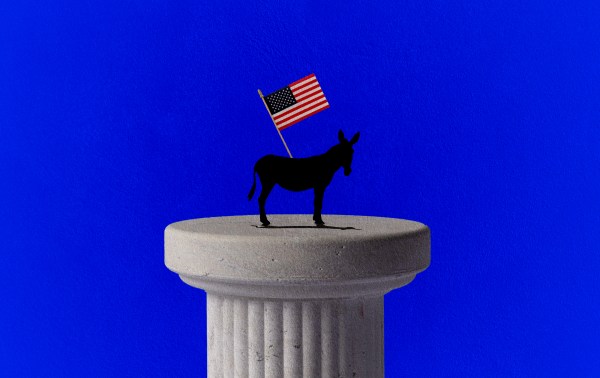I hope you won’t mind if I begin with a little “how the journalistic sausage gets made” anecdote. I think (and hope) you will find it amusing.
On Friday, I published a piece on what life is like right now for illegal immigrants in Southern California. (I think it came out pretty well; in a good year, I’ll have a really good feeling about maybe one out of 20 of my pieces, and this was one of them.) At one point in the article, I quote a Los Angeles-based lawyer and labor activist giving ICE and the federal government at large the rougher side of his tongue on the matter of what he called “Gestapo” tactics deployed in the arrest and detention of illegal immigrants. Declan Garvey, our executive editor, sent me a note saying that if we were going to include that, we needed to give the Department of Homeland Security (DHS) an opportunity to respond to the claims, which I hadn’t done. I emailed DHS, and Tricia McLaughlin, an assistant secretary of homeland security, gave me the reply I was expecting, which was very close to verbatim the reply DHS had given to others. And so I produced the following parenthetical:
(Journalistic convention compels me to note that Assistant Homeland Security Secretary Tricia McLaughlin called these allegations “disgusting and categorically FALSE,” all-caps in the original. The fact that I live on Earth and am not mentally disabled compels me to note that McLaughlin works for a serial fabulist, Kristi Noem, who works for another serial fabulist, Donald Trump, who once created an imaginary friend to lie to the New York Post about his sex life, in an administration packed to the gills with pathological liars such as J.D. Vance, who has an especial penchant for lying about poor, non-white immigrants who have the bad taste to move to places where there are white people, such as Springfield, Ohio. I wouldn’t want to mislead Dispatch readers into believing that DHS denials of these claims—or of anything else—are worth taking seriously. Hooray for journalistic convention.)
That was the toned-down version. My original draft (which I did not trouble my editors with) was a bit hotter, but substantively identical, just with a few extra gerunds that Declan would probably feel obliged to bowdlerize in keeping with our family-friendly house style here at The Dispatch.
As a non-paying reader, you are receiving a truncated version of Wanderland. You can read Kevin’s full newsletter by becoming a member here.
I don’t know what sort of person Tricia McLaughlin is. Maybe she is inclined to be honest, though I am not entirely convinced that there is, in practice, an honorable way to serve in the Trump administration, which is a coterie of creeps and drunks and weirdos and grifters and half-educated SHIFT-KEY enthusiasts and, above all, liars. Maybe she is the exception, though her earlier work—for Vivek Ramaswamy—suggests a pattern of seeking out perches on the shoulders of the craven and the dishonest. Today, McLaughin works for a dishonest boss, Kristi Noem, who made up obvious, easily disproved lies in her memoirs and continues to do so when she can take time from playing dress-up mall-ninja Barbie, i.e., recently insisting that 1 in 6 of the survivors of the Lahaina wildfires were forced to trade sexual favors for basic post-disaster assistance thanks to the corruption and incompetence of the Biden administration. There was plenty of stupidity and moral corruption in the Biden administration, which was, after all, presided over by Joe Biden, a lifelong serial liar with a gazpacho IQ and the ethical uprightness of an ether-deranged shoe salesman on an extended Labor Day weekend bender in Dewey Beach. But the thing about lies is, they are lies—irrespective of whether they are told about good people or terrible people. And Kristi Noem is a habitual liar. Donald Trump is a habitual liar whose youngest son is named after the imaginary friend he invented to lie to the New York Post about his sex life.
(I’m pretty sure I had a telephone conversation with Trump, in his “John Barron” persona, when he was thinking about running for president in 2012. But I didn’t know about “John Barron” back then, so I didn’t think to try to tell if it was Trump.)
There are some problems with that kind of endemic dishonesty in public life. There’s the obvious moral thing, of course, and the specifically religious scandal of a bunch of people who invoke their Christian faith every third sentence publicly taking consecutive high-volume hippopotamus dumps on the Ninth Commandment (“Thou shalt not bear false witness”) in each of the other two sentences. Watching my conservative-leaning, Trump-supporting, Christian friends, from the Catholics to the evangelicals, try to explain that away, twisting themselves into metaphorical knots that Dante would have done something awful with, fills me with dread. J.D. Vance, who lies about immigrants with comprehensively amoral facility, may be thinking about his place in history, but he should be thinking about his place in eternity.
But if you will forgive me for returning to a point that will be familiar (possibly too familiar) to my readers, there is an eminently practical side to all of this, too. Free societies run on trust—abuse that trust too much and you will create a society that is ungovernable and that consequently ceases to be free. Lack of trust enormously increases transaction costs on both sides of the government/governed line.
The things we have to do, for example, to police fraud in Medicaid (and the evidence is that we are not doing nearly enough, or doing what we do nearly well enough) cost a lot of money, which means that the program is more expensive than it has to be when you think about it in terms of real benefits provided per dollar spent. On the flipside, citizens who distrust the IRS (and not without good reason) may be less inclined to comply with the tax laws, which means that the IRS either has to spend more money on enforcement or that the Treasury has to forgo revenue, with more compliant taxpayers (including those future taxpayers who are, without having been consulted on the matter on account of their not yet having been born) being saddled with responsibility for our current extravagance—principal plus interest. Part of the magic mojo of those high-tax-but-happy Scandinavian welfare states is trust: People generally don’t feel like they’re being ripped off, that the system isn’t being too terribly abused, and that they are getting something of commensurate value for the high taxes they pay. Your taxes might be lower in Pakistan, but you’d miss what Denmark has to offer.
DHS says that the characterization of its actions by the critics I cited is “disgusting” (the word “disgusting” is a tell, by the way—disgust is the animating spirit of populist movements) and “categorically FALSE” (the all-caps thing is another tell, in this case, a specifically Trumpy one), and I, as a journalist and as a citizen, would like to know whether this is, you know, true.
It matters to me which side is telling the truth. Lawyers representing clients have a certain set of incentives, advocates carrying this or that banner have their own incentives, people in appointed political positions have incentives, and all of those have to be taken into account. But there is a difference between a lawyer who wants to make a persuasive case for his client and a lawyer who lies to you. There is a difference between an activist telling a sympathetic story and an activist who just makes one up. There is a difference between an up-and-coming politico who exaggerates her foreign-policy experience and one who simply invents a meeting with Kim Jong Un, as Kristi Noem did, or lies about canceling a planned meeting with Emmanuel Macron in protest of his views on the Middle East, something Noem also did. J.D. Vance’s trafficking in stupid and knuckle-draggingly racist nonsense about Haitians eating people’s pets in Springfield, Ohio, isn’t political spin—it is bearing false witness, in this case against poor and vulnerable people, which is despicable in and of itself and which also has corrosive effects on our ability to maintain a productive democratic conversation.
The problem for Tricia McLaughlin and DHS is that, even if she is telling the truth, I don’t really have any way to know and am not going to be inclined to believe her, because she chooses to work for dishonest people—and not only people who are dishonest but for whom dishonesty is a habit and a creed.
Which brings me to Megan Basham, a dim, boring liar who is nonetheless useful as an example of what politics on the right looks like in our time. Basham, who plays in the right-wing Christian sandbox (you can read my review of her excruciatingly stupid and dishonest Shepherds for Sale here, and I don’t know whose cornflakes I pissed in to keep getting these assignments) recently tweeted this carefully composed casserole of imbecility and insipidity: “We need a new red scare. And a new McCarthy.”
Assuming she’s talking about Tail Gunner Joe and not my friend Andrew C., it would be more difficult to think of a better example of what I am talking about.
Sen. Joe McCarthy committed one of my least-favorite political sins, one I used to associate with Bill and Hillary Clinton back when people cared about who they were, and that is: lying about things where the truth is on your side. President and Mrs. Clinton, back in the day, lied so much about so many things that it sometimes seemed they were doing it just to keep in practice. McCarthy lied—exaggerated, misrepresented, and flat-out made stuff up—about Communist (and we need the capital C here) infiltration of the federal government during a period when such exaggeration, misrepresentation, and fabrication were not actually necessary. There were a great many Communists in sensitive and influential positions in American life in those years, and I don’t mean lefty types who read The Communist Manifesto while undergraduates at Swarthmore but people who were associated with and working on behalf of the Communist Party USA—which was not a conventional political party but a front for the government of the Union of Soviet Socialist Republics—or directly in the service of the ghastly little cabal in Moscow that aspired to worldwide domination and that managed to kill some literally untold number (probably north of 60 million) of people during its time in power, including millions upon millions of Ukrainians intentionally starved to death. (Vladimir Putin didn’t get his big ideas out of nowhere.) Some of the names are still familiar: Alger Hiss, Julius and Ethel Rosenberg, Klaus Fuchs; others are less familiar: Harry Gold, Victor Perlo, Judith Coplon.
McCarthy was, among other things, an opportunist. The episode we now call the “Red Scare” consisted of two discrete periods, and its important figures included Richard Nixon, J. Edgar Hoover, and Robert Kennedy, among others. McCarthy came late to the game but saw that it was good sport, giving his famous speech (in which he claimed to have a list of 205 “names that were made known to the secretary of state as being members of the Communist Party and who nevertheless are still working and shaping policy in the State Department”) a few weeks after Alger Hiss’ perjury conviction. The number on the list changed from day to day (it was quickly reduced to 57), and it quickly became clear to many astute people, not least of them Dwight Eisenhower, that McCarthy was a cheap and vicious demagogue who simply made things up as it suited him. William F. Buckley Jr., who had been a vocal defender of McCarthy’s, later concluded that the senator’s dishonesty and antics had set back the cause of anticommunism rather than advancing it.
(Buckley would later write a novel, Redhunter, based on McCarthy, who also has a small cameo in another Buckley novel, Elvis in the Morning.)
Moral flexibility is put forward by apologists for such figures as McCarthy—and Donald Trump—as a matter of pragmatism. When a Stalin apologist inflicted on George Orwell the familiar proverb about needing to break some eggs to make an omelet, Orwell asked, reasonably: “Where’s the omelet?” There wasn’t one—just gulags and misery and repression and murder. The anticommunists were right to fight that. But McCarthy’s low character did not make it easier to fight Moscow’s agents in the United States—his sodden stupidity and willful dishonesty made it much, much more difficult, a fact for which his enablers bore some responsibility. In our time, the United States needs immigration reform, and consistent enforcement is going to have to be a part of that—and Donald Trump is going to make it a lot harder to get that done. J.D. Vance is going to make it harder to get that done. The clutch of fools around them—Kash Patel, Dan Bongino, Pam Bondi, Pete Hegseth, Robert Kennedy Jr.—is going to make it harder, because they have the net effect of undermining trust in government, including those such as Kennedy who are not directly involved in immigration. They do not seem untrustworthy—they are untrustworthy. Cheerleaders and enablers and turd-polishers great and small, from big noises such as Sean Hannity and Robert Jeffress to little fish such as Megan Basham, are making the kinds of reform they purport to desire harder to achieve, too.
Trump is a unique political presence. I expect that things will quiet down, at least a little, at least on the right, as he fades. But when conservative-leaning Americans do stop to catch their breath, I do hope that they will remember who lied to them, who went along with the lies, who celebrated the lies—and who didn’t.
Words About Words
A headline in the New York Times: “A Tiny Chef Inspires an Outsize Outpouring: Nickelodeon canceled ‘The Tiny Chef Show.’ Fans rallied around the wee gourmand.”
Gourmand is a much-abused word. It gets used wrongly, as in the Times headline, because it looks like gourmet. A gourmand is not a fancy chef or, necessarily, a fancy chef’s client—a gourmand is a glutton, albeit the kind of glutton who favors good food and wine rather than Taco Bell. To be a gourmand is to eat to excess, not to eat with a persnickety sense of refinement. The Tiny Chef in question is, as I understand it, a vegan and a not especially gluttonous one—so gourmand is probably the wrong word. I was reminded of a passage in Graham Greene’s The Comedians in which a progressive American crackpot traveling to Duvalier-era Haiti to establish a vegetarian center is invited at dinner to have a second helping of nut cutlet and protests that he is not a “gourmand.” (Also: “Second Helping of Nut Cutlet” is the name of my file of clippings from the second Trump administration.) More of a Tiny Chef-type guy.
There is another related use of gourmand, in perfumery: It describes a scent associated with food, such as perfumes or colognes based on vanilla or limes or something like that.
About that: What’s the difference between perfume and cologne? Concentration, basically: Perfume is what you call a product with a relatively high concentration of scent oils, while cologne is more diluted. In the United States (and throughout the English-speaking world, as far as I can tell), perfume is used to describe women’s scents exclusively, while men’s have many names: cologne, eau de toilette, splash, aftershave.
Aftershave is also an interesting word, from a marketing point of view: It is a way of giving a man an excuse to wear perfume while pretending that it is something functional, that it has been chosen for some utilitarian purpose. Someone once described the marketing genius of Rolex as “selling men jewelry while convincing them they’re buying tools,” and there’s something of that in aftershave, too, I think.
Not that there are no functional aftershaves. I think about this stuff a fair bit because I shave my head. One of the few times anybody has ever approached me about doing a product endorsement was for a razor designed for shaving heads, but I didn’t like it much, so I passed. I don’t get a lot of those requests. (Can’t imagine why.) I keep hoping that Brioni will give me a call. What has Oscar Isaac got that I haven’t?
Don’t feel absolutely obliged to answer that.
Elsewhere
I had a very fun conversation with Jonah and Sarah and Mike on The Dispatch Podcast. Check it out.
You can buy my most recent book, Big White Ghetto, here.
You can buy my other books here.
Please subscribe to The Dispatch if you haven’t. You can check out “How the World Works,” a series of interviews on work I’m doing for the Competitive Enterprise Institute, here.
In Closing
Here is a thing you might not get from my big piece on illegal immigration and California: As a policy matter, I am pretty firmly on the restrictionist side of the debate. For example, I would oppose, in principle, any so-called path to citizenship for people who became illegal immigrants in the United States as adults, whether they crossed the border in stealth or overstayed visas or whatever. I’m not too excited about the prospect of citizenship even for people who were brought here as children, for that matter, though I think we probably should make it easy for many of them to get green cards or some equivalent stable status. Citizenship should mean something.
I make a lot of arguments, of course, but I think of my main job—the thing where I’m most useful—as trying to help readers understand what is actually happening in the world, in this case, what life is like for illegal immigrants in Southern California right now. And I don’t think that it is good journalism to try to tailor the stories in such a way as to reinforce my policy preferences. Whatever your views on immigration, abortion, gun rights, whatever, there are going to be sympathetic stories and (very often) good arguments and situations that tilt the emotional balance toward the other side.
Getting immigration right is going to have a big, rigorous enforcement component, and that isn’t going to be limited in application to gangsters with face tattoos and 47 felonies on their résumés. But I believe that we can do a better job with the policy, and with the policy conversation, than we have, and that telling interesting and true stories helps us to understand what is actually happening in our ailing republic. Journalism isn’t propaganda—at least, it isn’t supposed to be. But if readers want better journalism, they’re going to have to demand it—because most of the market is going to end up leaning toward wherever it is easiest to get paid.








Please note that we at The Dispatch hold ourselves, our work, and our commenters to a higher standard than other places on the internet. We welcome comments that foster genuine debate or discussion—including comments critical of us or our work—but responses that include ad hominem attacks on fellow Dispatch members or are intended to stoke fear and anger may be moderated.
With your membership, you only have the ability to comment on The Morning Dispatch articles. Consider upgrading to join the conversation everywhere.